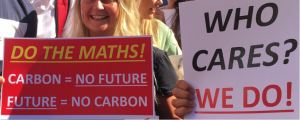
Rebels (not) without a cause?
A few days into the PGCE, we were told that there would be a climate change march on 20 September, for which arrangements had already been made to allow us to join. Unusual it certainly was, not because of the permission we were given to ‘rebel’ and be absent from uni classes for the afternoon, but because it was as much a learning experience for us PGCE student-teachers as it was for the young participants of the wider climate movement.
The Manchester rally was one of many that took place across the UK. Thousands of people took to the streets of central Manchester in protest against government inaction on what has been dubbed the climate crisis. Despite it being a normal school day, a sizeable portion of those who joined the rally were schoolchildren, many of whom took the decision to skip a day of school and went in school uniform. It was also heartening to see parents, who left their workplaces on a workday, join the march together with their children.

We saw a wide range of talents in the young participants of the demonstration: beautifully drawn placards, well-thought-out slogans and chants (some of which even rhymed!), cleverly made posters satirising economic growth at the expense of the environment, and even spontaneous, rousing speeches to stir up the crowd. As adult participants of the rally, we could not but be proud of the young people we saw and spoke to. The passionate expression of their concern for the environment stood in stark contrast to their powerlessness in the current democratic system, where many of them are still not of voting age and hence lack political representation.
One may assume that, given such fervent expression of their ideas as seen in the climate protests, young people and students would generally be regarded favourably by the public. However, the reality is much more complicated than this. Commonly associated with today’s youth are not positive qualities such as confidence, eloquence and creativity, but characterisations that they are disengaged and criticisms of their lack of independent and critical thinking. The truth though is likely to be somewhere in between.
We have all heard it (or have even said it ourselves) — they just cannot be bothered — and this precisely is the crux of the matter when working with young people today. Instead of describing them as lazy or disengaged, education practitioners should give young people the reasons to be ‘bothered’. We can see how important that sense of purpose is to young people. This is evident not only in the recent climate and Extinction Rebellion movements, but also in numerous civil protest movements in this tumultuous year of 2019 across different parts of the world, from Hong Kong to Chile and Catalonia in the Spanish state. Young people and students take an active part in these movements; they organise sit-ins, rallies and student strikes, while the tech-savvy ones mobilise support on digital platforms and the artistic ones create protest arts. These may not be the classic behaviours of ‘model students’ — indeed, they are more like those of the ‘rebellious’ ones — but are manifestations of the qualities that educators have always tried to cultivate in young people.
‘Rebels’ are what most classroom teachers dread. But if the rebels are not without a cause, things could perhaps be quite different.
Kent Li, Secondary Mathematics PGCE student teacher




0 Comments